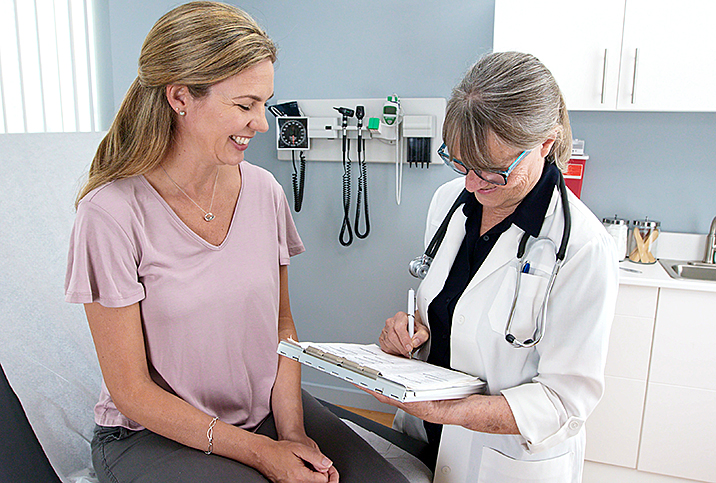Can Your Doctor Tell if You're Sexually Active?

If you've ever been to the gynecologist, you've probably been asked whether you are sexually active. It's a common question but one that could prove confusing.
Perhaps you've wondered what the term "sexually active" even means in medical circles.
That's not sex, for sure!
As a matter of fact, many adults and some physicians get conflicted about what activities constitute sex. In a 2015 study published in the Journal of Sexuality Education, which examined how men and women defined having sex, most (but not all) respondents agreed that penile-vaginal intercourse was "definitely sex."
However, a quarter of them didn't consider anal sex as "definitely sex." The respondents were even more divided over whether activities such as oral and manual stimulation counted, with only 24 percent of them considering oral sex as "definitely sex."
Another study carried out a year later aimed to determine what behaviors medical students considered to be sex. Its findings suggested that more than 25 percent of the participants did not consider genital-to-genital contact without penetration, oral-genital contact and foreign object in the rectum as sex.
As this research indicated, people have their own varied definitions of what sex actually is. A general consensus does exist that PIV (penis-in-vagina) sex is primarily what is considered when we talk about sexual activity.
However, strictly from a medical perspective, this term encompasses other activities, too.
"Any activity that involves potential fluid exchange and requires barriers to protect from sexually transmitted infections (STIs) is often considered as sex from a medical risk assessment. That is when you're answering a doctor's questionnaire," said Indigo Stray Conger, L.M.F.T., a Denver-based sex therapist for Mile High Psychotherapy who is certified by the American Association of Sexuality Educators, Counselors and Therapists (AASECT). "This includes any activity involving direct oral or genital contact with genitals or anus."
In addition to PIV, other activities considered sexual activity include:
- Anal sex
- Dry humping
- Manual stimulation (fingering or hand jobs)
- Oral sex
Masturbation is generally not considered when talking about sexual activity from a medical perspective because there is no exchange of body fluids.
If you aren't having any physical sexual contact with another person, there is no risk of contracting a sexually transmitted disease (STD) or STI unless you're sharing sex toys with someone who has an infection.
You have sex how often?
Generally, there isn't a certain frequency that's considered to be classified as "sexually active" from a medical perspective. Even if you're not having sex currently, telling your healthcare provider about your last sexual activity is imperative because it could still play a role in your overall sexual health.
"If I'm interviewing a person and taking a sexual history, I typically document what a patient tells me about their sexual activity up to two years ago," explained Kiarra King, M.D., an OB-GYN in the Chicago area. "We don't need to know every detail of a person's sex life, but it is helpful to get the general sense of someone's patterns so we can discuss concerns related to sexual health."
Can a doctor tell if you're sexually active?
A doctor's pelvic or physical exam is not enough to determine whether you are sexually active.
Sperm can be tested for in the vagina and anus, as with a forensic rape exam (rape kit) but beyond that, there is no physical evidence of being sexually active or not a "virgin" as part of an OB-GYN exam.
Contrary to popular belief, Conger said it's impossible for a doctor to establish sexual activity based on a hymen.
"The hymen is different for every person with a vulva," she added. "Some female bodies have one, some don't. They are of different sizes and thicknesses and may or may not cover the entire vaginal vestibule. The hymen may be broken during sexual activity or not. But it can also be impacted by tampon use or friction in the area from riding a bike or horse."
Basically, the only way for your doctor to tell if you are sexually active is if you tell them.
Why do doctors ask if you're sexually active?
There are several reasons why doctors ask this question. One of the main reasons is to assess your risk for STIs and offer screening.
"Doctors also ask this to assess if you're having any problems with sexual function such as pain, arousal disorders and erectile dysfunction (ED). It's also to gain clarity or context regarding anal, penile, vaginal or vulvar injuries," King said.
If you are sexually active, your doctor will want to counsel you on safe sex practices. This includes birth control and using barriers such as condoms and dental dams to protect you from STIs and unintended pregnancy.
All of this information remains strictly confidential between you and your doctor, so you should not be worried they'll share any information with someone else without your consent. For teenagers and younger, different healthcare providers may have different policies about this, so it may be best to confirm.
While you may feel uncomfortable talking about your sexual activity with your doctor, it's important to be open and honest. They want exactly what you want and that's what's best for you. You should always make it a priority to be well-informed about your sexual health.


















